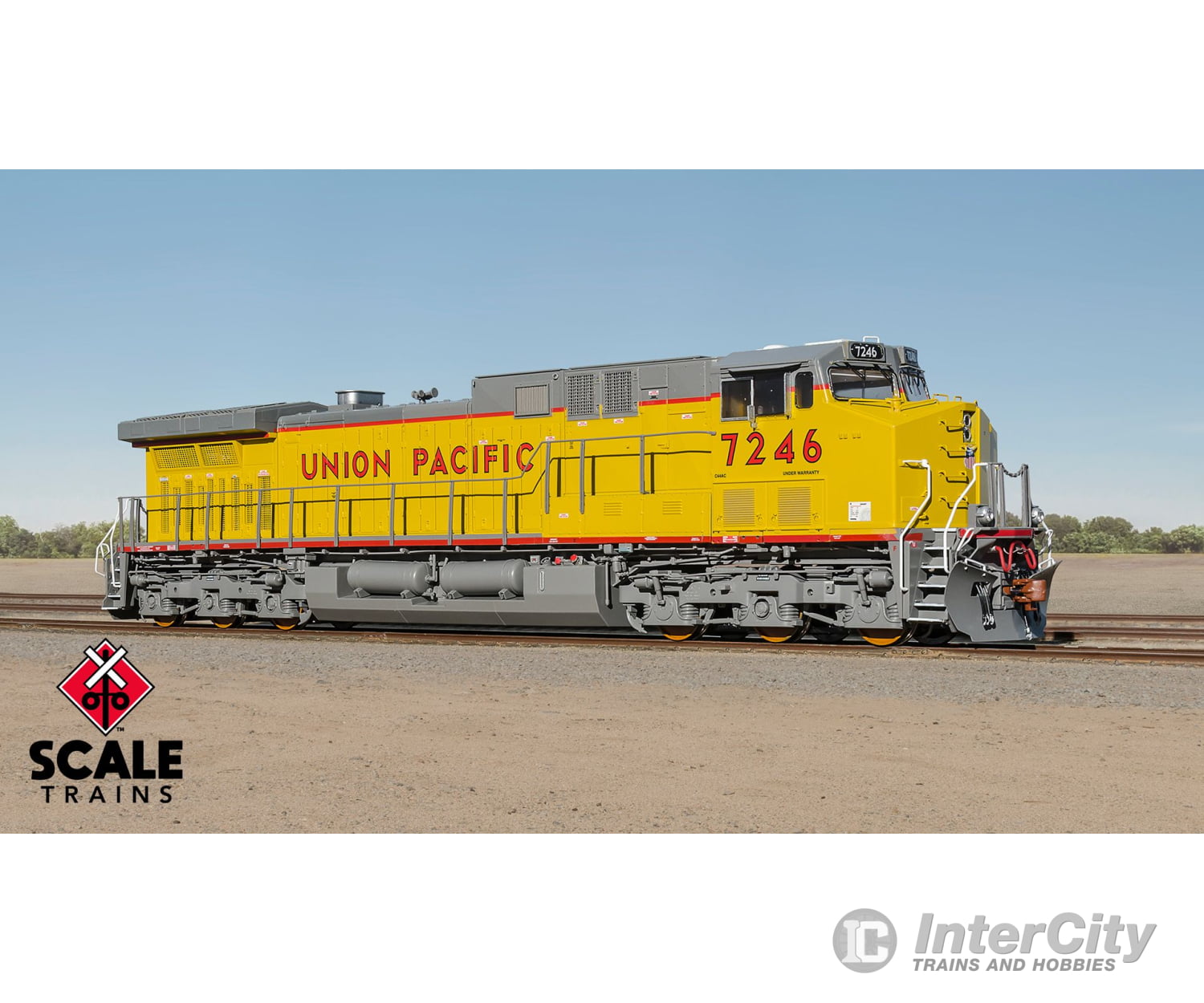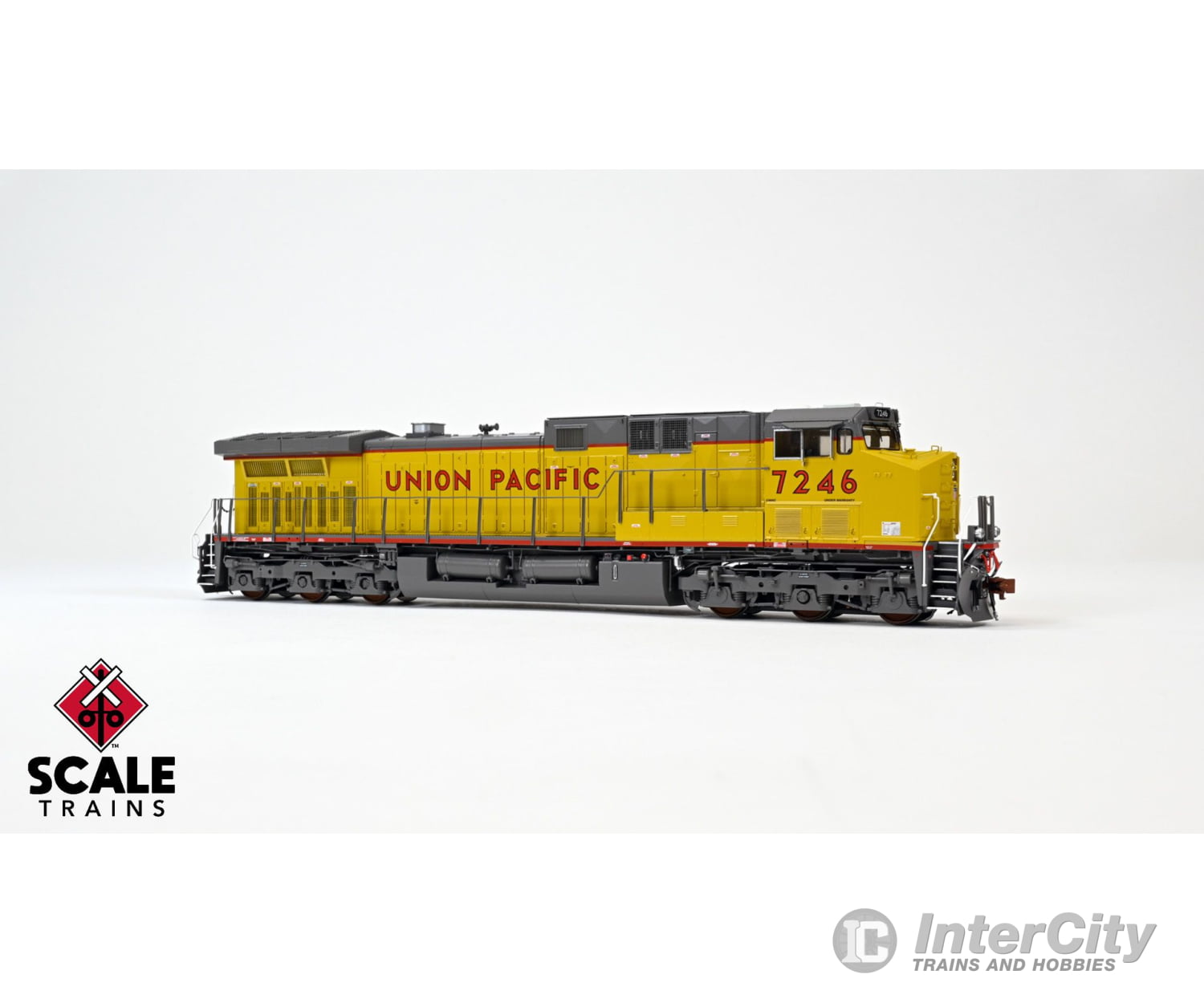Description
The Rivet Counter™ series AC4400CW is the definitive HO Scale model of GE’s revolutionary six-axle alternating current traction locomotive. Our model combines smooth operating performance with unparalleled railroad, road number, and era specific™ details along with industry-leading LED lighting features. Aside from wreck victims, nearly all prototype AC4400s are still in revenue freight service. And with burgeoning rebuild programs, this powerhouse locomotive class will likely be in service for many years to come.
Road Number Specific ScaleTrains
- New road numbers
- Series 7245 to 7262; built 10/1997
-
Road numbers 7246, 7247 and 7255
- Era: 1997 through late 2011
- ‘as delivered’ red sill stripes
-
Road number 7256
- Era: 1997 through late 2012
- ‘as delivered’ red sill stripes
- Fully-assembled
- Multiple road numbers
- Operating LED-illuminated ground lights on both sides of locomotive*
- Operating LED-illuminated front deck-mounted ditch lights**
- Operating LED-illuminated front, rear, and side walkway lights*
- Printed high-mount cab number boards with separately controlled backlit LED-illumination*
- Tall snowplow with open doors and two (2) grab irons
- Semi-scale coupler buffer equipped with durable metal semi-scale Type E lower-shelf knuckle couplers
- 5-step stepwells with see-through steps
- Walkway with front anticlimber
- GE “nub” pattern walkway tread
- Narrow profile end handrails
- Front nose headlight
- Nose door without window
- Two-piece nose top grab irons
- Battery cabinet access door without latch
- GE safety cab with three (3) side windows
- Right side cab under floor access doors: dual large louver panels per door
- Left side cab under floor access doors: dual latch door with grille forward of the HVAC unit
- Cab interior with detailed back wall and front dash, high-back seats, conductor’s workstation, and engineer’s desktop controls
- In-cab grade crossing camera
- Tinted cab side windows
- Tall mirror mounted in front of sliding cab side windows on both sides; additional small mirror on right side
- Octagonal antenna dome; small square antenna dome
- Intermediate: four (4) square bolted panels and three (3) tall horizontal X-panels
- Continuous reinforcement rib under dynamic brake intake grilles
- Standard dynamic brake exhaust (2-port)
- Rearward right-side air intake grille
- Left side auxiliary cab: three (3) short doors with latches on the #2 door; auxiliary cab filter box door
- Capacitor box on left side walkway
- Right side auxiliary cab: four (4) doors with latches on #1 and #4 doors
- Late angled engine cab profile with tri-fold power assembly access doors
- Lost-wax brass cast Nathan AirChime K3LAR2 horn mounted on engine cab
- Late non-flanged exhaust stack housing
- “Bathtub” exhaust silencer
- 26 individually-applied etched metal see-through radiator intake and exhaust grilles on sides and top of radiator compartment
- Right side late radiator door grilles in alternating heights
- Standard brake wheel
- Left rear hood door grille arrangement: tall, short, tall grilles
- Low-mounted rear sand fill
- Early “box” lifting lugs on ends of radiator wings
- Accurately profiled frame with separately-applied plumbing and traction motor cabling
- Late Hi-Ad trucks with cantilever struts on right front and left rear sideframes
- Rotating axle bearing caps
- No speed recorder
- Dual Graham-White (Prime) 975-075 air filters
- Graham-White 994-500 series air dryer
- 5,000-gallon fuel tank with vertical weld seams
- Single fuel fills per side
- Vertical analog fuel gauges; “blanked” round gauges; and digital fuel gauges
- Fuel tank mounted steel bell
- Separate air tanks with lower mounting brackets, connector pipe, and connector pipe cover
- Early square handbrake chain bracket
- Spare coupler knuckle holders on rear pilot face
- Factory-applied detail parts: wire grab irons, spare knuckles, trainline hoses with silver gladhands, 3-hose MU clusters with silver gladhands, uncoupling levers, windshield wipers, mirrors, sunshades, and more
- Motor with 5-pole, skew-wound armature
- Dual flywheels
- All-wheel drive
- All-wheel electrical pick-up
- Directional LED headlights
- Printing and lettering legible under magnification
- Operates on Code 70, 83, and 100 rail
- Packaging safely stores model
- Minimum Radius: 18”
- Recommended Radius: 22”
DCC & sound equipped locomotives also feature:
- ESU-LokSound 5 DCC and Sound decoder with “Full Throttle” Functions
- Two (2) cube-type speakers
- Accurate FDL-16 prime mover and auxiliary sounds, horn, bell, and more
- ESU-designed PowerPack with two (2) super capacitors***
- Operates on both DC and DCC layouts
DCC & sound ready locomotives also feature:
- Operate on DC layouts
- DCC ready with 21-pin connector
* Lighting features operate when using an ESU decoder with appropriate programming while operating using DCC
** In DC operation, both front ditch lights illuminate; rear ditch lights (if equipped) do not illuminate
*** Compatible with appropriately programmed ESU decoders while operating using DCC
The Union Pacific Railroad (UP) is one of the most iconic and historically significant freight railroads in the United States. Founded in 1862, it played a pivotal role in the expansion of the western United States, connecting the coasts and facilitating the growth of industries, commerce, and communities along its extensive network. With a sprawling track network of around 32,000 miles, Union Pacific remains a vital artery of transportation for freight and commodities across the nation.
In the early 90s, Union Pacific was looking to replace its aging fleet of locomotives by builders like EMD and GE. With many models approaching the two decade mark, it was time to upgrade. After having success with the DASH 8 series in the 80s, UP turned to GE once again to supplement its motive power needs. At the time, the Armour Yellow saw huge growth opportunities in Wyoming’s Powder River Basin where large coal deposits were found years prior. Wanting to tap into the market, UP needed new locomotives to handle the black diamonds – and a lot of it.
Union Pacific Railroad's strategic decision to prioritize the AC4400CW model over the DASH 9 model, despite the industry-standard DC traction of the time, was a pivotal move that reflected the company's commitment to innovation and operational efficiency. While the DASH 9s were known for their reliability and widespread use, Union Pacific recognized the advantages offered by General Electric's AC traction technology showcased in the AC4400CW. The AC4400CWs advanced alternating current traction system provided enhanced traction control, reduced maintenance costs, and improved fuel efficiency, aligning seamlessly with Union Pacific's goal of optimizing performance and maximizing operational capabilities.
Union Pacific would order more AC4400CWs than any other railroad – 1,338 total units by the time production ended in 2004. Throughout the production cycle, UP modified features of its AC4400CWs like number board placement (nose-mounted vs. cab-mounted), ditch light placement (pilot mounted vs. deck mounted), nose doors with or without a window, antenna and GPS dome arrangements, and more. Plus, through its acquisitions of both Southern Pacific and Chicago & North Western in the mid-1990s, Union Pacific added an additional 314 units to its roster, with a total exceeding 1,640 active AC4400CWs. Most are still in service today with many being rebuilt by GE and Wabtec in the late 2010s and early 2020s.








